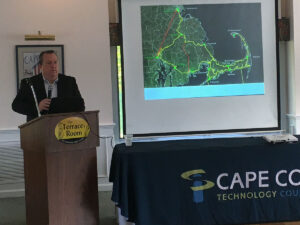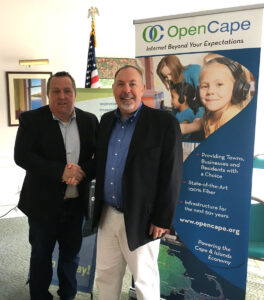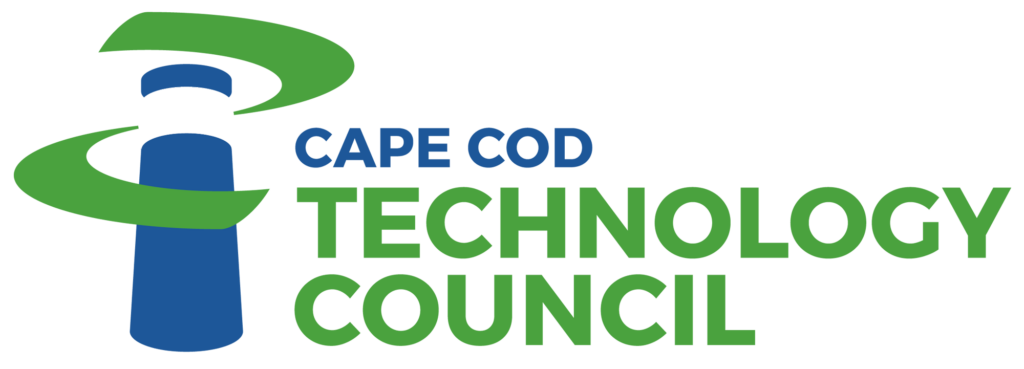
Our October First Friday’s speaker was Steve Johnson, Executive Director of OpenCape.
OpenCape has been busy this last year. In September 2016 they ended the relationship with CapeNet, bringing all operations under one roof. In addition to owning the network (as of November of last year), they do all sales, marketing, and maintenance in-house. Steve said it took them a couple months to assimilate existing structure – adding staff, redefining their process and evaluating how they could serve the region. He added that OpenCape has reduced the cost of goods sold by 50%, improving their cost structure.
Next, their strategy is to focus on businesses and clients closest to the network. Steve illustrated how they are building with a picture of downtown Hyannis, showing the backbone and connecting network. Steve explained that paying for build outs that are 1-5 miles off the backbone are expensive, and OpenCape doesn’t have the resources to absorb the cost of lateral connections.
They have to have conversations with clients with realistic expenses. In 2017 they revised pricing and published a price list (available on request), so everyone is paying the same thing. Steve said pricing was reduced by nearly 30% on 2GB, 5GB, and 10GB service, going head to head competitively with Comcast. He noted that having two players in town brings the price down, whether or not you chose to go with OpenCape. He understands initial caution – to many OpenCape is still the unknown player – but they’ve moved out of the “new business in town” stage and are now aggressively pursuing town, municipal and business clients to build a core network of clients and keep the network strong.
The network was built to support local economic development, but it doesn’t work to its best if the largest employers are not using it. “We need to make sure the businesses that are here, stay here,” he said. “We do attract people with great paying jobs, who want to live in our communities. That’s our economic development pitch: Work from the Cape. But in order to do that we have to have great connectivity.”
They’re working to expand the regional wide area network (RWAN). “We think it offers a tremendous value to towns,” Steve said. In September they had all the town managers and IT partners meet on how they can use this to their advantage, and help grow all our economic futures.

Already, OpenCape connects 16 of the 18 high schools on the Cape, and another 40 elementary and middle schools. They utilize tools like eRate, which help schools pay their monthly rate, and can fund the build. “When you have facilities like WHOI, NOAA, Bridgewater State University, the education applications are dramatic,” he said. “The amount of data that’s being used in high schools – 5 or 6 thousand devices are connected on a daily basis. We see that trend continuing.”
OpenCape also connects to police and fire, is investigating a public safety network so they can move data, and is testing a redundant microwave network so they’re covered if a hurricane knocks poles down.
But what many of us are asking is, when will we have fiber to the home? Steve sees fiber to the home as adding tremendous value to the region. “There’s significant dissatisfaction with what is currently offered out there,” he said. “Eighty percent of crowd fiber users are unhappy or very unhappy. It’s become clear that there’s not new investment in the region by the incumbent provider.”
Steve said 64% of businesses on the Cape have 1-4 employees, indicating a high number of home businesses and making fiber to the home critical to the Cape’s future. However, the Commonwealth’s focus is not on the Cape, it’s in Western Mass., where they are unserved. Where the Cape is more underserved than unserved, parts of every town here are unserved, so they are fighting for more focus here.
Fiber to the home requires massive scale and infrastructure OpenCape doesn’t have yet, so they are engaging the towns. Steve said some of the towns are already having this conversation and encouraged interested people to talk to their selectmen about where they are on getting connected. “This is the digital equivalent of a bridge that connects your town to the rest of the world,” Steve said. OpenCape will be hosting local information sessions with possible vendors. Towns need to consider what kind of technology they will use. “Once they make a decision, it impacts everything about the network, so we’re trying to educate people at the town level.”
“We’ll start to be much more visible in the marketplace, but I’m also trying to be cautious,” Steve concluded. “I don’t want to set unrealistic expectations. It’s hard to delineate between ‘I can connect your business’ and ‘I can’t connect your home right now.’”
